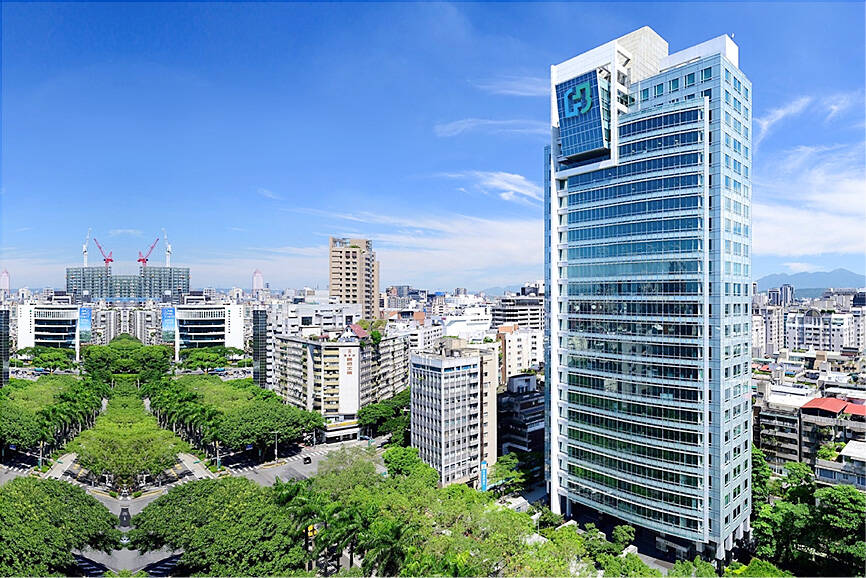Financial conglomerate Fubon Group (富邦集團) was the largest business group in Taiwan last year in terms of total assets, retaining the top spot on an annual local corporate list, Taipei-based credit information company CRIF (中華徵信所) said on Tuesday last week.
In its report on Taiwan’s top 100 business groups based on assets, CRIF said the group, which owns Fubon Financial Holding Co (富邦金控), had NT$12.24 trillion (US$393.37 billion) in total assets last year.
That was up 9.88 percent from a year earlier, as its life and non-life insurance units and securities business, as well as its banking operations in Hong Kong and China continued to grow, CRIF said.

Photo courtesy of Fubon Financial Holding Co
In 2020, Fubon replaced Lin Yuan Group (霖園集團) to become the largest financial group in the country for the first time, and saw its total assets grow to a record high last year, it said.
Lin Yuan, which owns Cathay Financial Holding Co (國泰金控), had NT$11.68 billion in total assets, taking the No. 2 spot, ahead of financial conglomerate CTBC Group (中國信託集團) with NT$7.13 billion; Taiwan Financial Holding Co (臺灣金融控股) with NT$5.99 trillion; Ruentex Group (潤泰集團), which owns insurance and property businesses, with NT$5.66 trillion; and Shin Kong Group (新光集團), which has financial, textile and property development operations, with NT$5.09 trillion, CRIF said.
Hon Hai Technology Group (鴻海科技集團), the world’s largest contract electronics maker, took seventh place with NT$5.07 trillion in total assets, followed by Taiwan Cooperative Financial Holding Co (合庫金控) with NT$4.43 trillion, Mega Financial Holding Co (兆豐金控) with NT$4.17 trillion and Formosa Plastics Group (FPG, 台塑集團) with NT$3.94 trillion, it said.
FPG, which owns flagship entity Formosa Plastics Corp (台塑), reported a 24.48 percent year-on-year increase in total assets last year, moving up two spots from 2020 to return to the top 10, as the COVID-19 pandemic and China’s “zero COVID” policy pushed up petrochemical product prices sharply.
The top 100 business groups in Taiwan reported NT$131.91 trillion in total assets last year, a record high, after rising 10.05 percent from a year earlier, CRIF said, adding that the 100 groups posted a 17.56 percent year-on-year rebound in sales, reversing a slight fall during the previous two years.
Hon Hai, also known as Foxconn Technology Group (富士康科技集團) internationally, generated NT$7.2 trillion in sales last year, up 10.62 percent from a year earlier on the back of solid demand for consumer electronics products and electronic components, CRIF said, adding that it was the first time the group had recorded revenue above NT$7 trillion.
It was the 14th consecutive year that Hon Hai had finished at the top of the sales rankings, it added.
FPG placed second after generating NT$2.27 trillion in revenue last year, ahead of electronics supplier and distributor Mitac-Sysnnex Group (聯華神通集團) with NT$1.92 trillion; Taiwan Semiconductor Manufacturing Co (TSMC, 台積電), the world’s largest contract chipmaker, with NT$1.61 trillion; and contract electronics maker Kinpo-Compal Group (金仁寶集團) with NT$1.40 trillion.
TSMC was the most profitable company in Taiwan last year after raking in NT$598 billion in net profit, followed by FPG with NT$265 billion, shipping and airline conglomerate Evergreen Group (長榮集團) with NT$251 billion, Hon Hai with NT$181 billion and shipping service provider Yang Ming Group (陽明) with NT$165 million, CRIF said.

Taiwan will prioritize the development of silicon photonics by taking advantage of its strength in the semiconductor industry to build another shield to protect the local economy, National Development Council (NDC) Minister Paul Liu (劉鏡清) said yesterday. Speaking at a meeting of the legislature’s Economics Committee, Liu said Taiwan already has the artificial intelligence (AI) industry as a shield, after the semiconductor industry, to safeguard the country, and is looking at new unique fields to build more economic shields. While Taiwan will further strengthen its existing shields, over the longer term, the country is determined to focus on such potential segments as

UNCERTAINTY: Innolux activated a stringent supply chain management mechanism, as it did during the COVID-19 pandemic, to ensure optimal inventory levels for customers Flat-panel display makers AUO Corp (友達) and Innolux Corp (群創) yesterday said that about 12 to 20 percent of their display business is at risk of potential US tariffs and that they would relocate production or shipment destinations to mitigate the levies’ effects. US tariffs would have a direct impact of US$200 million on AUO’s revenue, company chairman Paul Peng (彭雙浪) told reporters on the sidelines of the Touch Taiwan trade show in Taipei yesterday. That would make up about 12 percent of the company’s overall revenue. To cope with the tariff uncertainty, AUO plans to allocate its production to manufacturing facilities in

COLLABORATION: Given Taiwan’s key position in global supply chains, the US firm is discussing strategies with local partners and clients to deal with global uncertainties Advanced Micro Devices Inc (AMD) yesterday said it is meeting with local ecosystem partners, including Taiwan Semiconductor Manufacturing Co (TSMC, 台積電), to discuss strategies, including long-term manufacturing, to navigate uncertainties such as US tariffs, as Taiwan occupies an important position in global supply chains. AMD chief executive officer Lisa Su (蘇姿丰) told reporters that Taiwan is an important part of the chip designer’s ecosystem and she is discussing with partners and customers in Taiwan to forge strong collaborations on different areas during this critical period. AMD has just become the first artificial-intelligence (AI) server chip customer of TSMC to utilize its advanced

While China’s leaders use their economic and political might to fight US President Donald Trump’s trade war “to the end,” its army of social media soldiers are embarking on a more humorous campaign online. Trump’s tariff blitz has seen Washington and Beijing impose eye-watering duties on imports from the other, fanning a standoff between the economic superpowers that has sparked global recession fears and sent markets into a tailspin. Trump says his policy is a response to years of being “ripped off” by other countries and aims to bring manufacturing to the US, forcing companies to employ US workers. However, China’s online warriors